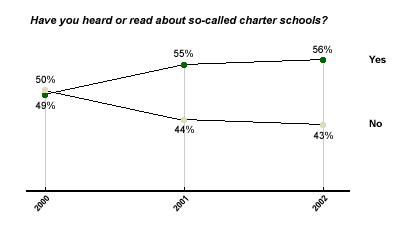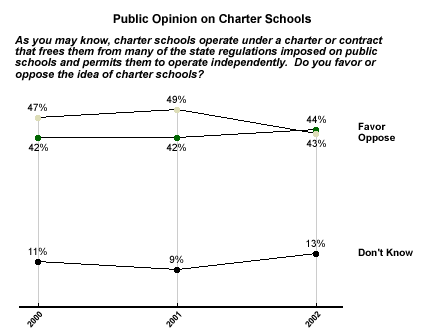Although charter schools have been teaching U.S. students for nearly a decade and currently exist in 37 states, many Americans remain unfamiliar with the concept of a public school operating outside the boundaries of the traditional public school system. That lack of familiarity may hamper opinion polls about the efficacy of such schools. Once they understand what charter schools are, how likely are Americans to support them?
Awareness of Charter Schools
According to the 2002 Phi Delta Kappa/Gallup Poll of the Public's Attitudes Toward the Public Schools*, 56% of Americans have heard or read about charter schools. Those with children in public school, those who attended college, and those with higher incomes are the most likely to have heard or read about charter schools.

Support for Charter Schools
Americans are divided in their opinions regarding charter schools. After reading a brief statement explaining that "charter schools operate under a charter or contract that frees them from many of the state regulations imposed on public schools and permits them to operate independently," Gallup asked respondents if they favor or oppose the idea of charter schools. Forty-four percent of Americans said they favor the idea while 43% oppose it. The percentage in favor has increased only slightly over the past two years.

Charter schools have proliferated largely in cities. Thus, it's not surprising that 52% of urbanites say they support such schools, compared to 44% of suburbanites and 39% of rural dwellers. "What has developed within the urban areas are schools that offer a variety of improvements over the basic public school as related to safety, parent and student satisfaction and involvement, teacher efficacy and ambitious standards to challenge students in an equitable atmosphere," said Tom Tompkins, former teacher and now dean of students at the Granville Charter School in Trenton, N.J. "The real question is, if the public school systems within the urban locations are failing the children . . . what alternatives are available to correct the problem?"
Charter schools may be part of the solution, but support for them varies among demographic groups. A majority (57%) of 18- to 29-year-olds favor charter schools, for example, while only 36% of those aged 50 and older feel the same.
Interestingly, Republicans are more likely to favor charter schools than are Democrats, by a margin of 51% to 33%. Linda Millert, a Republican, lives in a suburban New Jersey school district in which the public schools are considered among the best in the state. Yet she chose to send one of her children to a new charter school for the middle grades. "Although our experience with the public schools was good and both girls were adequately prepared for high school, we were curious if this new school could deliver something better. Lindsay's academic motivation and self-confidence are products of the charter school's systematic curriculum and higher expectations for its students," Millert said. "We took that gamble and it paid off."
Funding is another variable that comes into play in the level of support for charter schools. Sixty-five percent of Americans would oppose charter schools if funding them meant reducing the amount of funds for the regular public schools.
Accountability for Charter Schools
Even though charter schools are by definition differentiated from other schools by their independence from certain regulations that shape public education, most Americans (77%) want charter schools held accountable to the state in the same way that conventional public schools are accountable. This figure has remained consistent since last year and is similar to the 2000 figure. It appears that while many Americans favor charter schools in principle, many also hesitate to support schools that fall outside conventional constructs of American public education.
Key Points
Public education is a cornerstone of American society, and while Americans in general do not appear overly opposed to the idea of charter schools, when we dig deeper we see a reluctance to embrace significant changes that would impact the public school system or stray too far from established practices. A traditional classroom setting, funded by the government and under guidance from a centralized source, is still the first choice of most Americans.
*These results are based on telephone interviews with a randomly selected national sample of 1,000 adults, aged 18 and older, conducted June 5-26, 2002. For results based on this sample, one can say with 95% confidence that the maximum error attributable to sampling and other random effects is ±3%. In addition to sampling error, question wording and practical difficulties in conducting surveys can introduce error or bias into the findings of public opinion polls.